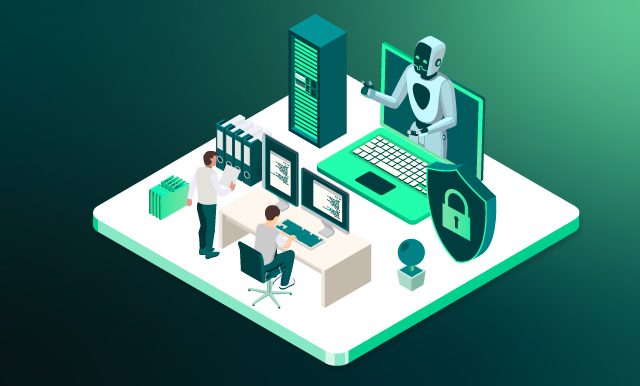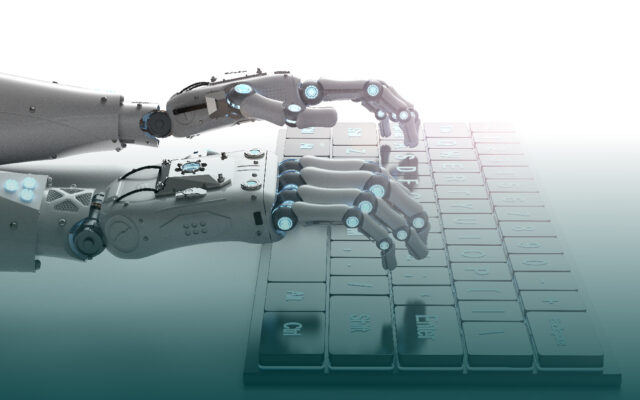Like many business owners, you might think your company can’t become a victim of cyber attacks. Or maybe you don’t think your data is valuable enough to be targeted. But not in the eyes of cyber criminals who are ready to bombard you at any time. That’s why every business should make cybersecurity a top priority to protect their data and clients’ interests.
From data breaches and malware to fraud and financial crimes, the damage from a cyber attack can be devastating. And you cannot predict how and when you may be hacked. If you don’t take steps to keep your business secure, the outcomes will be disastrous.
According to Statista, in 2023, three in four companies were at risk of cyberattacks in the USA. It is projected that in 2024, cybercrime will cost the U.S. more than $452 billion.
Luckily, AI is revolutionizing the fight against cybersecurity, encouraging companies to adopt artificial intelligence to resist cyber-attacks. The use of AI in cybersecurity is expected to grow by 23,6% before 2027, and it is projected to reach $46,3 billion.
In this article, we’ll dive into how AI security boosts businesses’ safety, the key AI data-protection methods, available AI cybersecurity solutions, and how AI is shaping the future of business.
A Dynamic Fusion AI and ML in Cybersecurity
AI in cybersecurity involves using machine learning methods and other advanced algorithms or intelligent software products to actively monitor network environments and combat cyber threats. AI in cybersecurity imitates the decision-making logic and routines of system administrators and cybersecurity experts.
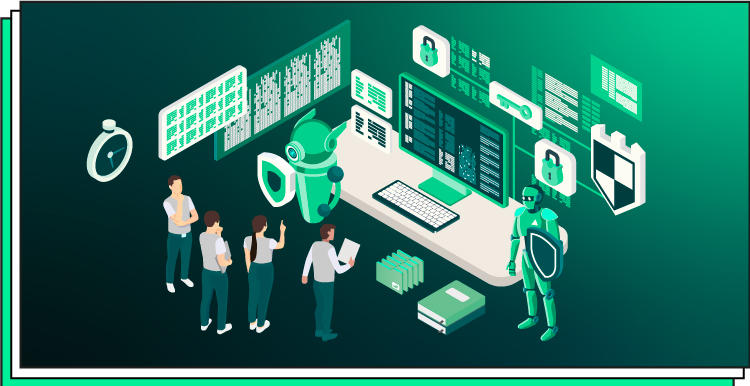
Discover the fundamental components of AI security:
- Threat monitoring
- Behavioral analysis
- Vulnerability management
- Fraud detection
What is a common feature of all of these models? They all combine and leverage the best capabilities of ML and cybersecurity. For mid-sized and large companies, handling large volumes of data is a top priority, whether it’s a local ISP or an office-based enterprise with numerous workstations.
This sounds like a job match for AI: When it comes to analyzing tons of data, cognitive computing outperforms humans. Let’s take a closer look at each of these AI security mechanisms.
Autonomous threat monitoring & detection for complex business environments
AI-based solutions can continuously monitor the computer system environments without human intervention. They control traffic graphs and details and track device parameters, user activities, and event logs to detect threats in real time or even before they occur. This approach to the use of AI in cybersecurity enables the electronic brain to apply adequate measures and prevent malicious agents from causing damage.
AI security can stay on duty and act 24/7, so human IT administrators do not need to work overtime or take night shifts. Thanks to correctly configured AI routines, a smart machine can help cybersecurity experts by working alone at night and on weekends. It keeps computer systems safe while employees enjoy their rest.
Moreover, AI in cybersecurity can handle tasks like diagnosing, updating, and fixing IT systems automatically. Humans only need to supervise and double-check their work.
Behavioral analysis for tracking suspicious activities online
Cognitive computing can analyze big data to identify suspicious user behaviors, detect undesired patterns in tons of connections, and either block suspicious stuff or prompt security teams to check it out and take further steps.
AI can use machine learning methods to adapt itself to different user behavior patterns, identify anomalies or malicious scenarios, and flag or manage them as potential threats. Implementation of AI/ML technologies in the cyber threat behavioral analysis allows security professionals to rely on statistical analysis more than on their experience or security protocols alone. This empowers them to resolve more issues in less time and spot plus eliminate all potential threats or cybercrime risks early.
Thanks to AI security, it’s possible to neutralize hacking attempts and shut down connections and sessions executed by malicious bots or suspicious users rapidly – this approach is extremely productive in the fields of web server-management technologies, social networks, copyright protection, and applications allowing simultaneous connections of numerous users, like online gaming and entertainment.
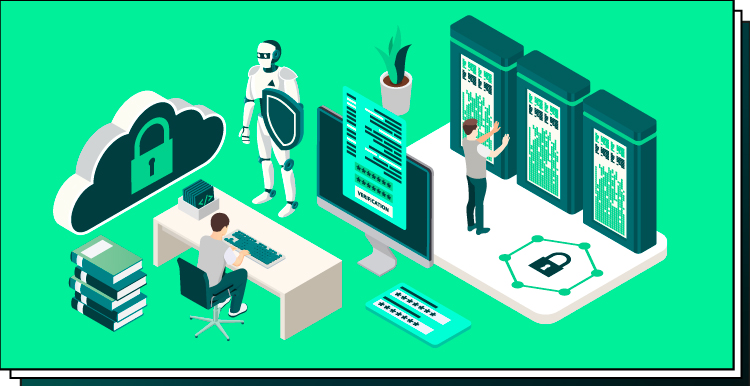
Vulnerability management for better sustainability
In the past, predicting and managing vulnerabilities in companies took lots of time and effort, with experts who had to analyze data and records manually. But now, with generative AI and machine learning, security professionals don’t have to spend forever aggregating data from different sources.
AI-supported vulnerability scanning & management solutions can potentially be set to scan and examine every important data source automatically or semi-automatically:
- Network traffic records
- IT system logs
- Threat intelligence feeds
- Software code sources
- User behaviors
- Bug reports
- Data breach reports, and so on.
The involvement of AI can not only help businesses by handling security, it also detects system weaknesses in real-time, helping companies fix them before hackers can exploit them.
Fraud detection: FinTech, insurance, e-commerce, banking, and governance
AI security systems can be deployed in economic and banking sector companies to ensure a robust and secure digital banking architecture and detect fraudulent activities, such as:
- Credit card fraud, like skimming and more
- Identity theft
- Phishing campaigns
- Insurance fraud
- Money laundering
- Real-estate fraud
- Phone bank fraud
- Financial manipulations
- Corruption
- Dark web dealing.
For this, AI FinTech solutions can be set to monitor and analyze tons of financial records, including financial transactions and payments, created and registered over long periods.
To get better results, financial data can be matched with client behaviors, like how they log in or what devices they use. AI security systems can quickly link all this information, spotting fraud or cybercrime attempts. This helps law enforcement react quickly and saves lots of money in return.
AI-based Security Solutions Currently in Use
How do companies use AI in cybersecurity? Since AI technologies have become cheaper to use and implement, more companies including medium or even smaller enterprises can benefit from creating custom AI-driven cybersecurity solutions.
More and more common businesses, including e-commerce platforms, are implementing AI to enhance their processes and reduce fraud or hackery. For example, online shopping services can benefit from AI applications that help them detect and flag atypically large orders or other suspicious shopping occurrences that contradict usual shopper patterns and habits. This approach allows for better detection of some types of account takeovers, credit card fraud, chargeback fraud, and also merchant fraud, which can cause multi-million losses to online businesses.
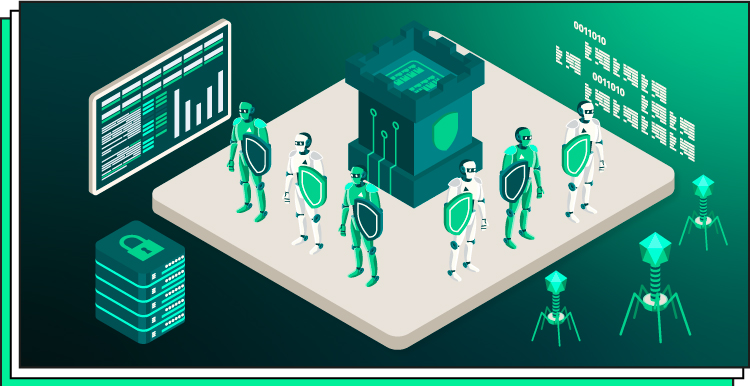
How to implement AI security systems?
Consider that third-party AI security solutions can be seamlessly integrated with your company’s software and network-management systems by your IT service provider. If you require skilled specialists capable of integrating AI cybersecurity solutions with your current IT environment, consider the Forbytes team.
Otherwise, check the options available: The most popular AI security systems include Darktrace, Cylance, and IBM Watson. All of these powerful platforms are designed to help organizations better protect their sensitive information against cyber threats:
Darktrace (based in Cambridge, the U.K.) is an AI-powered solution that utilizes machine learning algorithms to find and handle cyber threats without delay. It’s like having a watchful eye that observes an organization’s network, devices, and users to learn their regular activities. This system can establish a baseline or “normal” behavior specific to a certain organization’s IT ecosystem.
Any deviations from this baseline are then flagged as anomalies, which could indicate a potential cyber attack. When a problem is detected, Darktrace’s machine-learning algorithm kicks into action and can automatically handle the threat.
Cylance (acquired by BlackBerry in 2019) is an AI-powered malware-focused cybersecurity solution that leverages ML to detect and prevent malware attacks and other threats. Unlike traditional antivirus software that relies on signature-based detection, Cylance proactively distinguishes and blocks threats before they can cause any harm.
To achieve this, the system analyzes the characteristics of known malware and uses this information to identify new, previously unknown threats. This approach, known as predictive analysis, enables Cylance to provide a more comprehensive and effective defense against cyber attacks.
IBM Watson for Cybersecurity is a cognitive computing platform maintained by the famous IBM company. They aim to revolutionize the way organizations detect and predict cyber threats, and respond to them. The Watson-managed AI security system uses a combination of natural language processing, machine learning, and other AI technologies to analyze security data from a wide range of sources. With the help of advanced analytics applied to this data, IBM Watson can identify potential threats that might otherwise go undetected.
Moreover, it can provide recommendations on responding to different threats and automating certain security and data protection tasks, such as quarantining infected machines/files or blocking malicious traffic and connections. This helps reduce the workload on security engineers, enabling them to focus on more complex tasks and strategic objectives.
4 Major Advantages of Using AI in Cybersecurity for Your Business
The use of AI provides numerous advantages, including real-time threat detection, automatic response, scalability, cost-effectiveness, dark web monitoring, and insider threat monitoring. Remember that if you want to employ any of these advantages, you can rely on our skilled project managers who know how to build AI and ML solutions for cybersecurity in business.
Detection of cyber threats in real-time
One of the most significant benefits of AI-managed cybersecurity applications is their ability to detect threats instantly. With the ever-evolving frequency and technical sophistication of cyber attacks, it is essential to have a system that can keep up with trends, consider all previous experience, and detect plus respond to threats before they even arise and cause significant damage. AI has the necessary capacities to identify threats quickly, such as malware, phishing attacks, or unauthorized access, and take action to prevent them from causing any damage to your company.
Automatic response to cyber risks
Another advantage of AI in cybersecurity is its ability to respond automatically to threats, both known and yet unknown (predicted or hypothetical). By using AI to automate security processes, organizations can respond quickly and efficiently to various cyber threats coming from different directions.
Thanks to flexibility and scalability, AI-enhanced cybersecurity solutions can be an ideal choice for organizations with large networks, numerous computers, and diversified data sets. In this context, it’s important to mention that AI allows companies to:
- Minimize the impact of cyber-attacks and reaction time
- Rebalance the workload on their security teams
- Efficiently mine large amounts of security data and correlate information to generate reasonable cyber threat responses
- Align the response with multiple factors: data coming from technical logs, globally collected insights, network traffic patterns, and other important observations.
Cost-efficient AI-based cybersecurity approach
AI can reduce the cost of cybersecurity by automating many of the tasks traditionally performed by human analysts and IT security consultants or engineers. This means that organizations can save the working hours of computer experts by using AI solutions, and benefit from the effect that is equal to hiring large teams of cybersecurity experts.
Of course, the implementation of artificial intelligence is not a complete replacement for a skilled cybersecurity administrator, however, it allows humans to achieve far beyond their normal capabilities. A sophisticated AI/ML tool can provide even a single IT administrator with potential productivity and capacity levels similar to that of an entire cyber-security department, or even exceeding them.
Dark Web monitoring strategy
The Dark Web is a hidden (underground) network of websites and services that are not accessible through traditional search engines or web browsers and is often used by cybercriminals to buy and sell stolen data, such as credit card information, login credentials, and other sensitive information. AI-supported monitoring of the Dark Web can be one of the critical components of cybersecurity that involves checking the dark web locations for mentions of an organization’s name, employees, or data.
- AI platforms can deeply delve into the Dark Web and apply natural language processing to analyze content regarding specific organizations or their employees.
- If suspicious or sensitive content is detected, AI-powered software can immediately alert security teams to take appropriate action.
By monitoring the dark web, organizations can detect potential threats and data breaches before they become publicly disclosed or exploited by malicious agents. This allows cybersecurity administrators to take swift action to mitigate the impact of these threats and breaches, such as resetting passwords or notifying law enforcement bodies and/or affected customers.
Limitations and Potential Risks of AI in Cybersecurity
Everything comes with the reverse side, and AI cybersecurity is not an exclusion. There exist serious limitations and potential risks of AI applications in cybersecurity, including technical and legal concerns. Let’s check them to support your decision-making on whether to use AI/ML cybersecurity platforms in your company:
Bias in AI security systems
Bias is not only a human issue: Artificial intelligence systems are only as unbiased as the data they are trained on. If the data is somehow biased, then the AI system will generate biased results as well. This can lead to discriminatory outcomes in cybersecurity decision-making. It’s safe to say that popular AI platforms such as IBM Watson and Cylance invest in continuous and reasoned ML training to minimize the bias factor in their systems.
Misinterpretation
Even the best AI systems out there are still prone to so-called AI hallucinations. That’s why they can misinterpret certain information and make decisions based on false or incomplete data they were trained on. This can lead to incorrect threat assessments and potentially allow threats to go undetected, or otherwise increase the number of false positives, like blocking legit operations and kicking off authorized users.
Overreliance
While chasing after the lower costs of IT services, businesses and organizations may become too reliant on autonomous AI systems for cybersecurity, leading to complacency and a lack of human support or qualified oversight. These “robotic mode” conditions can cause the potential accumulation and impactful buildup of AI errors in cybersecurity systems. This creates new vulnerabilities, making the organization more susceptible to exotic cyber-attacks exploiting the loopholes found in AI-managed barriers (yes, cognitive computing still requires people nearby to provide efficient outcomes.)
Cybersecurity skills gap
There is a considerable shortage of skilled IT specialists, project managers, and other security professionals who can effectively deploy and manage AI systems. This can lead to poor implementation, misconfiguration, and inadequate approach to protection against cyber threats. This is a problem that our team can successfully help you with, just contact our AI engineers for a free cybersecurity consultation!
Privacy and legal complications
The utilization of AI systems in cybersecurity can raise essential privacy concerns as it may include the collection, processing, and analysis of personally identifiable data in large volumes. Applications of artificial intelligence in cybersecurity must undergo legal examination before being deployed, as they may not fully comply with privacy regulations.
Final Thoughts
With AI security systems, companies can respond to cyber attacks more effectively and enhance threat detection capabilities. AI-powered solutions can analyze tons of data in real time and identify vulnerabilities that humans can miss. So, with AI, you can detect potential security breaches and swiftly take proactive measures to safeguard your system.
At Forbytes, we provide AI integration & consulting services to implement the best AI-powered security solutions to help you mitigate threats promptly and prevent losses. Just contact us, and we’ll assist you in fueling your system with AI security software.

Our Engineers
Can Help
Are you ready to discover all benefits of running a business in the digital era?

Our Engineers
Can Help
Are you ready to discover all benefits of running a business in the digital era?
